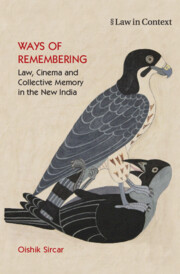Book contents
- Frontmatter
- Dedication
- Contents
- List of Figures
- Acknowledgements
- List of Abbreviations
- 1 Law and the Aesthetics of Atrocity
- 2 A Jurisprudential-Aesthetic Approach
- 3 The Best Bakery Judgments: Aesthetics of Judicial Memory
- 4 Bollywood’s Law: Cinematic Justice and Collective Memory
- 5 ‘As They Ought’
- Notes
- Glossary
- Bibliography
- Index
2 - A Jurisprudential-Aesthetic Approach
Published online by Cambridge University Press: 30 April 2024
- Frontmatter
- Dedication
- Contents
- List of Figures
- Acknowledgements
- List of Abbreviations
- 1 Law and the Aesthetics of Atrocity
- 2 A Jurisprudential-Aesthetic Approach
- 3 The Best Bakery Judgments: Aesthetics of Judicial Memory
- 4 Bollywood’s Law: Cinematic Justice and Collective Memory
- 5 ‘As They Ought’
- Notes
- Glossary
- Bibliography
- Index
Summary
Law tells stories, just as stories are told about law.
This book studies two narratives of collective memory of the 2002 anti- Muslim pogrom in Gujarat from a law in/as aesthetics perspective. The first is written into the texts of the judgments of the Best Bakery case, a key criminal trial related to the pogrom, and the second is captured in the images and sounds of three Bollywood films that make the pogrom central to their plots. I have developed the jurisprudential-aesthetic (J-A) approach as a lens for reading the texts of the judgments and films not as discrete narratives but as a shared one. My J-A reading will show that collective memories of the pogrom are shaped by the workings of a postcolonial state-making and state-preserving rationality.
This chapter describes the J-A lens as a critical legal approach to interpret my material. To discuss how I constitute the J-A approach, first, I explain why it is necessary to understand law's aesthetic dimensions as a minor jurisprudence. Second, I argue in favour of considering this minor jurisprudence of law and aesthetics as a narrative compact. Third, I animate the workings of the narrative compact as law in aesthetics and law as aesthetics. This chapter shows how law permeates cinema's imagination and how the J-A approach becomes necessary for an appreciation of cinema's lawscape. To do this, I indicate the key concerns that a study of law in/as cinema addresses, connect law in/as cinema scholarship and Indian film studies to describe the aesthetic specificities of the Bollywood genre and discuss what work the J-A approach will do to show how law and justice feature in Bollywood's cinematic imagination.
Constituting the J-A Approach
Law and cinema are, arguably, the two most publicly available records of collective memory of Gujarat 2002. The pogrom has been one of postcolonial India's most litigated events of mass violence, and by far the most mediatised of all anti-minority religious conflagrations. The Best Bakery case—whose judgments are the focus of Chapter 3—attracted huge media attention as the first high-profile trial related to the pogrom. The three Bollywood films (which I study in Chapter 4) released across theatres all over India are now available on DVD, have been broadcast on television and are streaming on online platforms.
- Type
- Chapter
- Information
- Ways of RememberingLaw, Cinema and Collective Memory in the New India, pp. 27 - 41Publisher: Cambridge University PressPrint publication year: 2024



